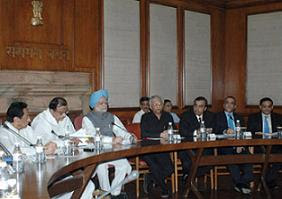
PM Manmohan Singh has said that Indian corporates and banks have been hit by shrinking global credit dampening investor sentiment, asserting that the government will take steps to sustain growth momentum.
In a meeting with captains of industry and business to assess the impact of global meltdown, he asked the industry not to show "knee-jerk reaction" such as large scale layoffs that may lead to a 'negative spiral'.
"The financial crisis has exacerbated a global downturn that was expected earlier but is now likely to be more severe and prolonged. A crisis of this magnitude was bound to affect our economy and it has.
"International credit has shrunk with adverse effects on our corporates and banks. Global uncertainty is also tending to dampen investor sentiment," he said.
India's first priority was to protect the financial system from possible loss of confidence or contagion effect.
"The situation is abnormal and we need to be constantly on the alert. The situation is being watched on a day to day basis and more steps will be taken if required," he said while assuring that "... our banking system both in the public and private sector is safe and government stands behind it and no one should fear for the safety of bank deposits."
The meeting was attended, among others, by Mukesh Ambani, K V Kamath, Shashi Ruia, Deepak Parekh, K P Singh, while Finance Minister P Chidambaram, RBI Governor D Subbarao and Planning Commission Deputy Chairman Montek Singh Ahluwalia were also present on Monday.
During the meeting India Inc asked the Prime Minister to inject enough liquidity and ensure slashing of interest rates to drive the economy on a high growth trajectory.
The Prime Minister asked the industry leaders to refrain from large-scale layoffs.
"While every effort needs to be made to cut cost and raise productivity, I hope there will be no knee-jerk reaction such as large-scale layoffs, which may lead to a negative spiral," Singh said.
Advising the Indian corporates not to let the global crisis shake their confidence, he said the industry "should bear in mind their societal obligations in coping with the effects of the crisis".
Pointing out that expanding investment in infrastructure can play counter-cyclical, he said, "We will review projects and programmes...to ensure that their implementation is expedited and they do not suffer from constraints of funds."
Singh said India would seek reform of the international financial institutions and improved regulation to "prevent recurrence of such crises".
The Prime Minister made these remarks ahead of the G-20 meeting being convened by US President George Bush on 15th November to address world's worst economic crisis after the Great Depression of 1929.
On its part, India Inc asked the government to pull out all stops to ensure availability of enough money to drive the economy on a high growth trajectory despite the global meltdown.
CII President K V Kamath said, "If this country has to progress, we need to set what is the growth we want, and the growth rate clearly the government has articulated is around 8 percent. If that is so, we need to work back (and see) what is the interest rate that will drive this growth."
FICCI President Rajeev Chandrasekhar said, "If we have to really address this issue (global crisis), the focus of the government without any ambiguity should be on driving growth and all the fiscal and monetary policies must be inclined to deliver growth."
The Government will set up a core group of ministers to ensure the problems faced by the industry are addressed to limit the impact of credit sqeeze on the economy, Commerce Secretary G K Pillai, who was present at the Prime Minister's meeting with the industry, said.
"It (committee) may be headed by either Prime Minister or Finance Minister," Pillai said.
Finance Minister P Chidambaram, Commerce and Industry Minister Kamal Nath and Deputy Chairman of Planning Commission Montek Singh Ahluwalia are likely to be on the panel.
Pillai said the government would react "positively" to the suggestions made to revive the housing and construction sectors, which were prime drivers of the economy.
Business leaders are concerned over the plunge in the industrial growth to 1.3 percent in August from a high of 10.9 percent in the same month a year ago, mainly on account of poor performance by the manufacturing sector which expanded by a mere 1.1 percent.
For the five-month period (April-August 2008-09), the industrial production growth rate stood at 4.9 percent, down from 10 percent during the corresponding period last year.
Under the impact of a slowdown in major economies, India's exports growth has also declined to 10.4 percent in September this year after showing a impressive expansion of over 35 percent for the April-August period.






